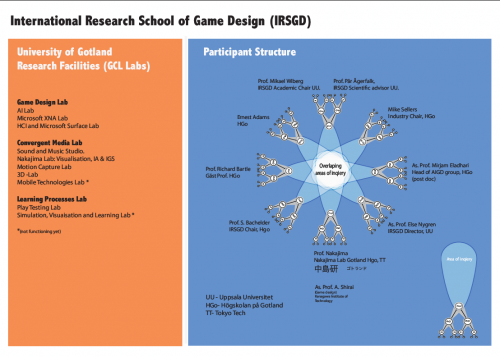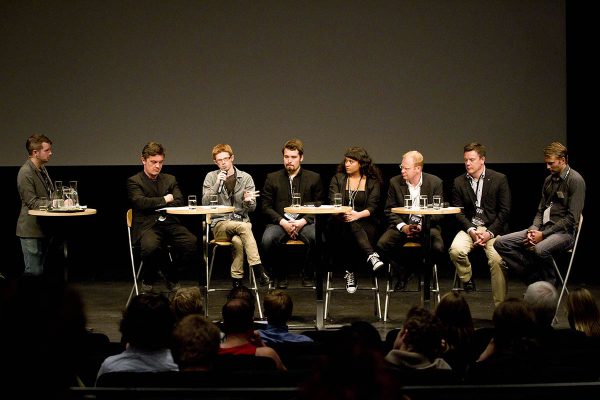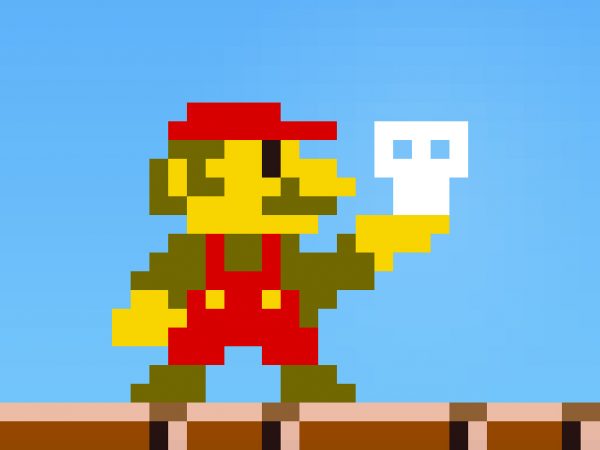Bonnie Ruberg (Berkeley)
 Bonnie Ruberg is a PhD student at the University of California at Berkeley, where she studies comparative literature and new media, and specializes in representations of “perversion” through language – both literary and digital. She has also worked as a video game and tech journalist for publications like The Village Voice and The Economist, covering everything from female monsters in Resident Evil to prostitution in Second Life to lesbian imagery in Portal.
Bonnie Ruberg is a PhD student at the University of California at Berkeley, where she studies comparative literature and new media, and specializes in representations of “perversion” through language – both literary and digital. She has also worked as a video game and tech journalist for publications like The Village Voice and The Economist, covering everything from female monsters in Resident Evil to prostitution in Second Life to lesbian imagery in Portal.
Bonnie opens the Gotland Game Conference with a keynote talk on interpreting videogames like litterature and other art forms.
Scott Jon Siegel (Playdom)
 Scott Jon Siegel was employee #70 or so at Zynga, where he was lead design on Word Scramble for iPhone, and a game designer on Café World for Facebook, which at its peak had 10 million people playing it every day!
Scott Jon Siegel was employee #70 or so at Zynga, where he was lead design on Word Scramble for iPhone, and a game designer on Café World for Facebook, which at its peak had 10 million people playing it every day!
He cut his game design teeth at area/code in New York, creators of hits like Drop7 on iPhone, Parking Wars on Facebook, and CSI: Crime City on Facebook. area/code was recently acquired by Zynga to become Zynga New York.
Around that same time he wrote regular columns for both Escapist Magazine and Joystiq, on the design of non-digital games, and reviewing non-digital games, respectively.
Currently, he’s working as a Game Designer at Playdom. He was Design Lead on City of Wonder.
Scott has a presentation during the second day of GGC, trying to bring indie game developers on to the social gaming scene.
Ernest Adams (International Hobo)
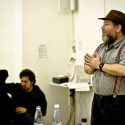 Ernest Adams is one of our many live-from-the-industry lecturers. He’s been in the game industry since 1989 and currently works as a free lance game designer, writer and teacher.
Ernest Adams is one of our many live-from-the-industry lecturers. He’s been in the game industry since 1989 and currently works as a free lance game designer, writer and teacher.
His Fundamentals of Game Design has been a staple in our game design courses for years. Ernest has written four books in total and he has developed online, computer, and console games for everything from the IBM 360 mainframe to the Nintendo Wii. Ernest is also the founder and first chairman of the International Game Developers’ Association and a popular speaker at conferences and arts festivals around the world.
Sofia Hård (skillpoint.se)
 Sofia Hård has written about games since 2001 for a wide range of publications, and was one of the first journalists signed for skillpoint.se when it launched late 2010. She’s also a regular name in Sundsvalls Tidning, FRIDA, Sydsvenska Dagbladet, Ginza and Sweden Rock Magazine.
Sofia Hård has written about games since 2001 for a wide range of publications, and was one of the first journalists signed for skillpoint.se when it launched late 2010. She’s also a regular name in Sundsvalls Tidning, FRIDA, Sydsvenska Dagbladet, Ginza and Sweden Rock Magazine.
Oskar Skog (LEVEL)
 Oskar Skog has written about games for magazines such as Super PLAY, RESET, Robot and +N. He’s currently writing for Sydsvenskan, LEVEL and Loading.se.
Oskar Skog has written about games for magazines such as Super PLAY, RESET, Robot and +N. He’s currently writing for Sydsvenskan, LEVEL and Loading.se.
Uzi Geffenblad (Zigzag Animation)
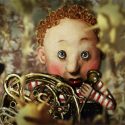 Uzi Geffenblad is a Stockholm based composer and an awarded director, producer and screenwriter of animation. He’s the co-owner of the production company Zigzag Animation.
Uzi Geffenblad is a Stockholm based composer and an awarded director, producer and screenwriter of animation. He’s the co-owner of the production company Zigzag Animation.
Jess ica Laurén (Filmtecknarna)
ica Laurén (Filmtecknarna)
Jessica Laurén is originally a 2D-artist that has found her ways through the jungle of new styles. Now she makes both classical 2D-animation and mixed techniques including photo and film collages. She has worked for several animation companies in Stockholm where she has had different occupations as animator, designer, storyboard artist, supervisor etc. Her director career started with her short film “Water of the Sun”, made during her first parental leave, animated to music written and performed by herself. For that she got the Filmens Dags scholar ship at the Gothenburg Film Festival. Her next direction project was produced at Filmtecknarna: An animated TV-series for children, called “Kiddie Thoughts”.
It was based on stories drawn and written by her own daughters, included ten episodes and was broadcasted in most of the Scandinavian countries. After that she started to direct commercials and music videos at Filmtecknarna, and has now been a Filmtecknarna director for five years. Jessica has just completed the first spots for a major US campaign for Frito Lay chips, through Canadian Agency Juniper Park. The campaign involves tv commercials, webisodes, comic strips etc. Jessica has been responsible for all the designs, as well as being creative director for the moving images. At present she is directing a new animated TV-series for children, named “Who”, based on the books with same name by the Swedish author/illustrator Stina Wirsén.
Samson Wiklund (gameplayer.se)
 I am Samson Wiklund, Interaction Designer and co-writer of the book “Open Softwear – Fashionable prototyping and wearable computing using the Arduino” .I am currently a resident of the glorius nation of Sweden and active as Editor for GamePlayer.se and Producer and Host for the old-school centric podcast “Retroresan”.
I am Samson Wiklund, Interaction Designer and co-writer of the book “Open Softwear – Fashionable prototyping and wearable computing using the Arduino” .I am currently a resident of the glorius nation of Sweden and active as Editor for GamePlayer.se and Producer and Host for the old-school centric podcast “Retroresan”.
Most people think of design as the colorful wrapping to dazzle the users eyes. I consider that one of the most widely spread lies of the universe. Sure, an element of design is the visual approach, but if that were the foundation, anyone with a crash-course in Photoshop would be a designer. I consider design, especially interaction design, to be the taste, mood and sensation throughout the entire use-experience. good design flows through the product: the interface, the form, the input and the output. Sometimes beautiful, sometimes butt-ugly, but always by purpose.
A reaction is never an accident.
Chris Lindgren (Toca Boca)
 Chris Lindgren loves creating digital fun for kids. Her company Hutnu! is responsible for several online games at Swedish Television´s Bolibompa website and she is now working as a Play Designer for touch screen devices at Toca Boca.
Chris Lindgren loves creating digital fun for kids. Her company Hutnu! is responsible for several online games at Swedish Television´s Bolibompa website and she is now working as a Play Designer for touch screen devices at Toca Boca.
Toca Boca is a game studio that makes digital toys for kids. We think playing and having fun is the best way to learn about the world. Therefore we make digital toys and games that help stimulate the imagination, and that you can play together with your kids. Best of all – we do it in a safe way without advertising or in-app purchases.
Our team consists of experienced play designers, art directors, developers (or “playsmiths” as we call them), interaction designers and marketers. Together we try to make digital products that kids love to play with. We started to put everything together in September of 2010, and our first products launched in March 2011.
Eric Jacopin (Military School of Saint-Cyr)
 When it comes to stealing students’ energy, Eric Jacopin produces machinimas with Operation Flashpoint and Virtual Battle Space 2 (and he’s thinking of moving to Far Cry or Crysis). When it’s time to give some of his energy, he teaches Object Oriented Design, Turing Machines and Project Management. When the world beat is too strong, he applies artificial intelligence planning to fast paced video-games. And when it’s impossible to resist to the beauty of this planet, he uses pillows of snow to sketch figures in the air. Also, from time to time, he likes to experiment with 3200 ASA black and white film rolls and super-wide angle lenses.
When it comes to stealing students’ energy, Eric Jacopin produces machinimas with Operation Flashpoint and Virtual Battle Space 2 (and he’s thinking of moving to Far Cry or Crysis). When it’s time to give some of his energy, he teaches Object Oriented Design, Turing Machines and Project Management. When the world beat is too strong, he applies artificial intelligence planning to fast paced video-games. And when it’s impossible to resist to the beauty of this planet, he uses pillows of snow to sketch figures in the air. Also, from time to time, he likes to experiment with 3200 ASA black and white film rolls and super-wide angle lenses.
Note for the curious; Wikipedia have some good information in english about the École spéciale militaire de Saint-Cyr.
Annika Fogelgren (Ravn Studio)
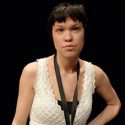 Annika Fogelgren is a Producer for the Norwegian game company Ravn Studio. She has been working at various game companies in Sweden with QA, management and creative processes.
Annika Fogelgren is a Producer for the Norwegian game company Ravn Studio. She has been working at various game companies in Sweden with QA, management and creative processes.
Ravn Studio is an independent game development studio based in Drammen, Norway. It was established in 2002 is the only Norwegian company licensed to develop on all the major gaming platforms; Nintendo Wii and DS, Sony PSP, PlayStation 2 and PlayStation 3, and Xbox 360.
Ravn Studio has an experienced team of developers creating quality driven titles which are fun to play from age 6 and up. Their internal technology is available on all platforms setup with multi-threading and cross platform support at its core. Ravn Studio has two teams one which are working on Nintendo DS titles for children and the other part of the company working for an older target group with a variety of platforms.
Brian Schwab (Blizzard)
 Brian Schwab is a Senior AI/Gameplay Engineer at Blizzard Entertainment. He has over 15 years industry experience, including 13 published titles. He has worked seemingly forever on making engaging and fun game experiences by using a MacGyver style combination of anything nearby: be it academic AI techniques, hand rolled state/tree hybrid systems, or multiplying his birthday with the sum of the jump button presses divided by the number of current extra guys. Brian has done work in AI, gameplay, game design, and has even been lead designer on a few titles. He s worked at companies ranging from three person start ups to SCEA. His projects have ranged from edutainment to location based thrill rides to his current gig on a super-secret project at Blizzard. When not cramming fun into a C++ compiler, he has also spent a good deal of time writing. His book AI Game Engine Programming recently released its second edition, and hes also been an AI editor for the Game Programming Gems books.
Brian Schwab is a Senior AI/Gameplay Engineer at Blizzard Entertainment. He has over 15 years industry experience, including 13 published titles. He has worked seemingly forever on making engaging and fun game experiences by using a MacGyver style combination of anything nearby: be it academic AI techniques, hand rolled state/tree hybrid systems, or multiplying his birthday with the sum of the jump button presses divided by the number of current extra guys. Brian has done work in AI, gameplay, game design, and has even been lead designer on a few titles. He s worked at companies ranging from three person start ups to SCEA. His projects have ranged from edutainment to location based thrill rides to his current gig on a super-secret project at Blizzard. When not cramming fun into a C++ compiler, he has also spent a good deal of time writing. His book AI Game Engine Programming recently released its second edition, and hes also been an AI editor for the Game Programming Gems books.
Industry Credits
PC Title: Candyland for Hasbro Interactive.
Arcade: Savage Quest for Angel Studios
PS1: Medal of Honor: Underground for Dreamworks Interactive
XBOX: Buffy the Vampire Slayer for Fox Interactive
PS2,PS3: NBA 2003-2009 serires for Sony Computer Entertainment of America
PC: Battlenet for Blizzard Entertainment
PC: Starcraft 2 for Blizzard Entertainment
Brian is presenting a talk on more believable Artificial Intelligence – first thing on the second day of GGC.
Richard Dansky (Red Storm)
 The Central Clancy Writer for Red Storm/Ubisoft, Richard Dansky was named to Gamasutra’s list of Top 20 Game Writers in 2009. In his eleven years in the industry, he was worked on franchises including Splinter Cell, Ghost Recon, Far Cry and Might & Magic. His recent titles include Splinter Cell: Conviction and the upcoming Ghost Recon: Future Soldier.
The Central Clancy Writer for Red Storm/Ubisoft, Richard Dansky was named to Gamasutra’s list of Top 20 Game Writers in 2009. In his eleven years in the industry, he was worked on franchises including Splinter Cell, Ghost Recon, Far Cry and Might & Magic. His recent titles include Splinter Cell: Conviction and the upcoming Ghost Recon: Future Soldier.
A regular speaker at GDC, Richard is a member of the advisory board for the Game Narrative Summit at GDC Online and an executive of the IGDA’s Game Writing Special Interest Group. He’s contributed to several books on game writing, including Writing for Video Game Genres.
In addition to his game writing, Richard has published five novels, most recently the critically praised Firefly Rain. He is a regular contributor to magazines such as Bull Spec and Green Man Review, and his short fiction has appeared in New Heroes, Man Vs. Machine, Dark Faith and others. In addition, he worked extensively on multiple games for White Wolf Game Studio, and spent a brief period as the world’s greatest living authority on Denebian Slime Devils.
Richard lives in North Carolina with his wife, statistician and writer Melinda Thielbar, and their conspiratorially minded cats. You can find him online at http://www.richarddansky.com, and on Twitter as @RDansky.
Dajana Dimovska (KnapNok Games)
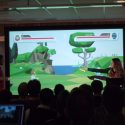 Dajana Dimovska is CEO and Producer at KnapNok Games (Copenhagen Game
Dajana Dimovska is CEO and Producer at KnapNok Games (Copenhagen Game
Productions). She is managing young talented team of game developers and
working on experimental physical party game concepts. She is one of the
founders and Board Members at Copenhagen Game Collective, which is network
of game companies, non-commercial projects, and creative individuals with
the agenda of developing and promoting experimental games. Dajana is also
the Vice Chairman at IGDA Denmark, none-profit game developers association
with a purpose to unite, grow and promote the Danish game community.
KnapNok Games is a young Danish game company, who is exploring novel game
concepts for social and physical digital game platforms such as Nintendo
Wii, Microsoft Kinect, Sony
Playstation Move and smartphones. Their vision is to develop and publish
novel game concepts where players interact directly and look at each other
rather than focusing solely on the interactions happening on the TV screen.
KnapNok Games is one of the core member game companies at Copenhagen Game
Collective.
Tove Bengtsson (Svenska Dagbladet)
 With an academic background in cinema studies, Tove Bengtsson started off as a game critic for gaming magazine Super Play in 2007. Since then she has been very active in Swedish gaming media, hosting the web based gaming show Kadooosch (produced by MTG) and writing for the news agency TT Spektra. Since 2010, she writes about games for national newspaper Svenska Dagbladet. Most recently she also started writing for Laser, a new Swedish gaming magazine.
With an academic background in cinema studies, Tove Bengtsson started off as a game critic for gaming magazine Super Play in 2007. Since then she has been very active in Swedish gaming media, hosting the web based gaming show Kadooosch (produced by MTG) and writing for the news agency TT Spektra. Since 2010, she writes about games for national newspaper Svenska Dagbladet. Most recently she also started writing for Laser, a new Swedish gaming magazine.
Johannes Wadin (Might & Delight, Tapeduck)
 With over five years experience in both the Swedish, as well as the international game development industry, Johannes has made a name for him self with titles such as Just Cause 2 (Avalanche Studios) and Fable 3 (Lionhead Studios) under his belt. He is currently employed as Lead Level Designer at the newly founded, Stockholm-based, studio Might and Delight.
With over five years experience in both the Swedish, as well as the international game development industry, Johannes has made a name for him self with titles such as Just Cause 2 (Avalanche Studios) and Fable 3 (Lionhead Studios) under his belt. He is currently employed as Lead Level Designer at the newly founded, Stockholm-based, studio Might and Delight.
He’s also been tutoring Game Development on the side through out most of his career. Ranging from Guest Lecturer at many of the Swedish Game Dev Schools, to responsible for several of the Game Design-courses at Futuregames Academy / Berghs School of Communication, and Head Lecturer at the, now former, Level Design-school Enter the Garden.
Lately he’s been starting up his own company, Tapeduck, that specializes in connecting Game Development Schools in Sweden with highly experienced Game Development Professionals all over the world.
Johannes is moderating the open discussion on Gotland’s game industry.
Linda Kiby (Paradox)
 Linda started out doing a thesis at Avalanche, where she stayed for another four years as level designer and later technical designer. Just Cause 2 was the main project she worked on there. Right now she works for Paradox Interactive, a game developer and publisher. There she does IT, tech support, in-game localization and installers but the main work task is community manager.
Linda started out doing a thesis at Avalanche, where she stayed for another four years as level designer and later technical designer. Just Cause 2 was the main project she worked on there. Right now she works for Paradox Interactive, a game developer and publisher. There she does IT, tech support, in-game localization and installers but the main work task is community manager.
Paradox has in a few years established as a leading strategy games publisher in the international games industry. We work with developers and distributors all over the world and you can find our games at Walmart, EB Games, Steam and Gamersgate among others.
At Paradox we have a lot of different positions. Programmers, historical researchers, game designers, QA and event scripters for the internal development team and on the publishing side we can work with sales, marketing, PR, project management and as producer for our third party titles.
Emma Melander (Nordic Game)
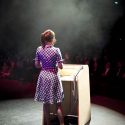 Emma is currently working as an Executive Producer of the Nordic Game Program. She is mainly responsible for the Nordic Game Conference and the Nordic export missions to GDC S.F., Gamescom Cologne, and Tokyo Game Show etc. Emma started her career with games at the Swedish Game Institute then moving on to the project SuperMarit, with the mission to get more women in to the gaming industry, and then landing in Malmö at the Nordic Game Program where she has been working the last 3 years. Furthermore Emma is also a member of the board at the Game Assembly, Starbreeze and Sverok.
Emma is currently working as an Executive Producer of the Nordic Game Program. She is mainly responsible for the Nordic Game Conference and the Nordic export missions to GDC S.F., Gamescom Cologne, and Tokyo Game Show etc. Emma started her career with games at the Swedish Game Institute then moving on to the project SuperMarit, with the mission to get more women in to the gaming industry, and then landing in Malmö at the Nordic Game Program where she has been working the last 3 years. Furthermore Emma is also a member of the board at the Game Assembly, Starbreeze and Sverok.
Emma is a native Gotlander and has been to every Gotland Game Award since the very beginning.
The Nordic Game Program is a part of the Nordic cultural cooperation and is funded by the Nordic Council of Ministers. The programs mission is to help secure a broad availability of quality Nordic computer games in the future. The work of the Nordic Game Program includes the Nordic Game conference, Nordic Game activities at games industry events around the globe, as well as Nordic game development support, information and infrastructure activities
Mikael Hedberg (Frictional Games)
 Mikael Hedberg is a writer attached to the Swedish game studio Frictional Games, who have over the years become known as masters of the horror genre. Their latest title Amnesia: The Dark Descent, has earned a cult status since its release, with many fans claiming it to be the scariest game ever made. The last few months Mikael and the company have been working with Valve to create an Alternate Reality Game for the highly anticipated release of Portal 2. After its successful launch, they are now back at work on their next accursed title.
Mikael Hedberg is a writer attached to the Swedish game studio Frictional Games, who have over the years become known as masters of the horror genre. Their latest title Amnesia: The Dark Descent, has earned a cult status since its release, with many fans claiming it to be the scariest game ever made. The last few months Mikael and the company have been working with Valve to create an Alternate Reality Game for the highly anticipated release of Portal 2. After its successful launch, they are now back at work on their next accursed title.
Tommy Palm (Fabrication Games)
 Tommy Palm, Entrepreneur and Game Designer – Tommy started programming games for Commodore 64 back in 1986 as a hobby, it continued to be a hobby until 1999 when he founded Jadestone. Since then he has been working as concept creator and game designer on more than 10 game titles including Championship Manager Online, World in War, Karlsson på Taket (mobile), Dirk Dagger and Kodo. During the eight years developing mobile games; his team has been awarded nine international awards and numerous nominations latest IMGA and IGF Mobile. In 2009 Jadestones Mobile department spawned of into a new company Fabrication Games that Tommy currently runs. He is also the CEO of The Game Trail, a new media company that spawned from one of Fabrication Games’ products.
Tommy Palm, Entrepreneur and Game Designer – Tommy started programming games for Commodore 64 back in 1986 as a hobby, it continued to be a hobby until 1999 when he founded Jadestone. Since then he has been working as concept creator and game designer on more than 10 game titles including Championship Manager Online, World in War, Karlsson på Taket (mobile), Dirk Dagger and Kodo. During the eight years developing mobile games; his team has been awarded nine international awards and numerous nominations latest IMGA and IGF Mobile. In 2009 Jadestones Mobile department spawned of into a new company Fabrication Games that Tommy currently runs. He is also the CEO of The Game Trail, a new media company that spawned from one of Fabrication Games’ products.
He enjoys teaching in his spare time, writes articles and is a regular speaker at conferences like Game Developers Conference. He holds lectures at The Royal Institute of Technology in Stockholm and has been a member of the jury for IGF Mobile, Nokia Innovation Challenge and Swedish Game Awards.
Linda Dahlberg (apegroup)
 With over 30 titles in the bag, Linda has been involved in making games and applications on a range of platforms – from PSX and Nokia N-Gage to PS3 and iPad. And most devices in between.
With over 30 titles in the bag, Linda has been involved in making games and applications on a range of platforms – from PSX and Nokia N-Gage to PS3 and iPad. And most devices in between.
Linda entered the industry in 2002, working with functionality & localization testing at a test house in Glasgow. In 2006 she moved down to Cambridge to head up the QA team at Ninja Theory, working on Heavenly Sword for PS3.
In 2008 it was time to return to Sweden again, to join the Stockholm based developer GRIN – working as an associate producer on Bionic Commando for PS3 and X360, and later acting producer on the PC version of the title.
Since 2010, Linda has been managing a number of development projects on mobile platforms with apegroup – a digital agency specializing in mobile services. Producing applications for iPhone, iPad and Android, the award-winning studio helps companies to reach out to their customers in new digital ways.
Jonatan Söderström (Cactus)
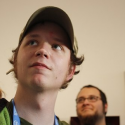 JONATAN SÖDERSTRÖM – BETTER KNOWN AS CACTUS – IS A SWEDISH INDEPENDENT VIDEO GAME DEVELOPER BASED IN GOTHENBURG. HE SPECIALIZES IN DEVELOPING GAMES OF AN EXPERIMENTAL NATURE. WHETHER IT BE THROUGH BIZARRE PLOTS, NEW GAME MECHANICS OR STRANGE GRAPHICS, YOU’RE ALWAYS BOUND TO FIND SOMETHING OUT OF THE ORDINARY.
JONATAN SÖDERSTRÖM – BETTER KNOWN AS CACTUS – IS A SWEDISH INDEPENDENT VIDEO GAME DEVELOPER BASED IN GOTHENBURG. HE SPECIALIZES IN DEVELOPING GAMES OF AN EXPERIMENTAL NATURE. WHETHER IT BE THROUGH BIZARRE PLOTS, NEW GAME MECHANICS OR STRANGE GRAPHICS, YOU’RE ALWAYS BOUND TO FIND SOMETHING OUT OF THE ORDINARY.
HE IS WELL KNOWN FOR HAVING A CONTINUOUS OUTPUT OF GAMES AND HAS DEVELOPED OVER FORTY TITLES TO DATE. HE HAS REACHED WIDE ACCLAIM THROUGH HIS WORKS, WHICH ARE OFTEN FEATURED ON WEBSITES, BLOGS, AS WELL AS GAME AND ART FESTIVALS ALL OVER THE WORLD.
Ylva Liljeholm (Film På Gotland)
 Ylva Liljeholm works with young filmmakers at Film På Gotland. She is originally a journalist and have worked freelance for many years – mostly writing about culture and also literature reviews and film critics. She has participated as a member of the ecumenical jury at international film festivals in Berlin, Locarno, Gothenburg, Leipzig, Leeds and Lübeck. She regularly writes about film over at Seglora Smedja and recently also at Svenska Kyrkan. She also writes teachers tutorials for the Swedish Film Institute.
Ylva Liljeholm works with young filmmakers at Film På Gotland. She is originally a journalist and have worked freelance for many years – mostly writing about culture and also literature reviews and film critics. She has participated as a member of the ecumenical jury at international film festivals in Berlin, Locarno, Gothenburg, Leipzig, Leeds and Lübeck. She regularly writes about film over at Seglora Smedja and recently also at Svenska Kyrkan. She also writes teachers tutorials for the Swedish Film Institute.
Film på Gotland started in 1995 and works with all parts of film culture on Gotland; film pedagogic issues, supporting short- and documentary filmmakers, development of smaller cinemas and other screening arenas, public arrangements, projects for young filmmakers and a lot of networking on local, national and international levels. Film on Gotland is part of the Gotland municipalitys´ Culture and Leisure department.
Robert Tatnell (Lionhead)
 Rob Tatnell is a rising star in video games development and is fast becoming one of the leading visual effects artists of the industry. After graduating from the Britain’s prestigious National Centre for Computer Animation he was quickly swept up into the video games industry at the hands of Sony Computer Entertainment. With a strong artistic and technical background, Rob is always pushing for blockbuster special effects on every project. He has worked on several exceptional titles such as Heavenly Sword (Ninja Theory) and Killzone 2 (Guerrilla) and is currently working at Lionhead Studios in the UK on their multi-million selling Fable franchise. Most recently responsible for over half of the effects on Fable III he is presently leading the FX charge on an exciting unannounced project.
Rob Tatnell is a rising star in video games development and is fast becoming one of the leading visual effects artists of the industry. After graduating from the Britain’s prestigious National Centre for Computer Animation he was quickly swept up into the video games industry at the hands of Sony Computer Entertainment. With a strong artistic and technical background, Rob is always pushing for blockbuster special effects on every project. He has worked on several exceptional titles such as Heavenly Sword (Ninja Theory) and Killzone 2 (Guerrilla) and is currently working at Lionhead Studios in the UK on their multi-million selling Fable franchise. Most recently responsible for over half of the effects on Fable III he is presently leading the FX charge on an exciting unannounced project.
In his spare time Rob keeps his passion for strange and experimental video games alive by working on his own small scale iOS and Xbox Live projects. He also takes a great interest in the orient and after having studied Japanese for many years he enjoys losing himself in books on Japanese lore, history, culture and art.
Rob is keen to see projects that think beyond the normal and into the experimental, and is very much looking forward to seeing the creativity on display at the conference.
Johan Sylwander (Starbreeze)
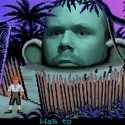 Johan is an Aeronautical engineer turned Gameplay Programmer. He started working in games 7 years ago with a short internship at Avalanche Studios in Stockholm. The internship led to employment as a Gameplay Programmer and he stayed at the studio for 5 years working on the titles Just Cause and Just Cause 2. Wanting to try something different, he then spent 18 months working for a newly started studio in Guildford (England) called Supermassive Games Ltd. There he worked on launch titles for the PS3 Move Controller as well as making some prototypes for future projects.
Johan is an Aeronautical engineer turned Gameplay Programmer. He started working in games 7 years ago with a short internship at Avalanche Studios in Stockholm. The internship led to employment as a Gameplay Programmer and he stayed at the studio for 5 years working on the titles Just Cause and Just Cause 2. Wanting to try something different, he then spent 18 months working for a newly started studio in Guildford (England) called Supermassive Games Ltd. There he worked on launch titles for the PS3 Move Controller as well as making some prototypes for future projects.
Returning to Sweden in March, Johan tried working outside of the games industry. It lasted 8 days. He then quit his job and started the following week at Starbreeze Studios, where he now works happily on an unannounced AAA project. Always wanting to expand his skill set, Johan has been involved in a lot of hobby projects – some of which can be seen on his portfolio page. His secret dream is to one day revitalize the Point-and-Click genre by making an engaging and frustration-free adventure game. Not gonna happen.
Mats Andersson (Avalanche)
 Mats Andersson started his career as a computer specialized arctic warrior, which is not as cool as it sounds by far, and a writer/illustrator for the very very nerdy swedish roleplaying magazine ‘Runan’. As a true pioneer, he visited the island of Gotland to be apart of the first class ever to graduate from the HGO GAME education back in 2004 – his proudest accomplishment being a real, human sized muppet, who insulted you until you beat it to death. After a short detour at Dice in order to write a bachelors thesis on their conceptual development methods right during the worst of the BF2 crunch, he landed at Avalanche studios, best known for Just Cause 1 and
Mats Andersson started his career as a computer specialized arctic warrior, which is not as cool as it sounds by far, and a writer/illustrator for the very very nerdy swedish roleplaying magazine ‘Runan’. As a true pioneer, he visited the island of Gotland to be apart of the first class ever to graduate from the HGO GAME education back in 2004 – his proudest accomplishment being a real, human sized muppet, who insulted you until you beat it to death. After a short detour at Dice in order to write a bachelors thesis on their conceptual development methods right during the worst of the BF2 crunch, he landed at Avalanche studios, best known for Just Cause 1 and
2, where he has been toiling away designing games and leading small teams for the past 6 years – last time he checked, he had apparently earned the title Senior Game Designer.
He has also managed to be head teacher at the leveldesign school The Garden during a couple of years as well as lecture game design and production methods at HGO and FutureGames Academy whenever he can get out of the office without the producers noticing.
Kian Bashiri (Might & Delight)
 Kian Bashiri grew up on Macromedia Flash. He was first attracted to it as a tool for animating but gradually got more interested in coding, finding it to be an incredibly expressive and rewarding way to design.
Kian Bashiri grew up on Macromedia Flash. He was first attracted to it as a tool for animating but gradually got more interested in coding, finding it to be an incredibly expressive and rewarding way to design.
While studying game programming at Stockholm’s University and School of Future Entertainment, Kian put his time to good use by getting involved with the Swedish independent games scene and making several lauded hobby projects – for instance Swarm; a Swedish Game Awards winning mobile game and Metro rule of conduct; an experimental game about the awkward situation of commuting on the Stockholm subway. In 2008 he released his most well known game, the very conceptual You Have To Burn The Rope which was highly praised for it’s tongue-in-cheek commentary on the role of interactivity in games.
To this date You Have To Burn The Rope has been played five million times, it has been featured on exhibitions, Gamasutra placed it in its annual Top 5 Indie Games list and in 2009 it was nominated for the prestigious Independent Games Festival Innovation Award.
After an internship at EA DICE where he researched and developed an AI path following solution Kian joined new game studio Might and Delight to create a playful retro-flavored pearl of a game.
Working with code and text all day he has recently grown a strong interest for typography.
Madeleine Von Post (Fatshark)
 Madeleine is an experienced animator specializing in hand-key character animation, both 2D and 3D. With a higher education background of Computer Science and Games Development she completed her studies with a PgDip at the renowned London Animation Studio, Central Saint Martins. After graduation she joined the talented team at Lionhead Studios where she specialized further in advanced facial animation as well as realistic wild animal animation on project Milo and Kate. Early 2011 she moved back to the Swedish games industry scene, lecturing animation at Futuregames Academy/Berghs School of Communication and now currently working as an animator at the wonderful Stockholm based studio Fatshark.
Madeleine is an experienced animator specializing in hand-key character animation, both 2D and 3D. With a higher education background of Computer Science and Games Development she completed her studies with a PgDip at the renowned London Animation Studio, Central Saint Martins. After graduation she joined the talented team at Lionhead Studios where she specialized further in advanced facial animation as well as realistic wild animal animation on project Milo and Kate. Early 2011 she moved back to the Swedish games industry scene, lecturing animation at Futuregames Academy/Berghs School of Communication and now currently working as an animator at the wonderful Stockholm based studio Fatshark.
Fatshark is an independent games development studio, having developed their own games as well as subcontracting several AAA titles for consoles and PC. Recent releases are *Lead and Gold: Gangs of the Wild West* and *Bionic Commander Rearmed 2* for Capcom. Soon to be released in Q2 2011 is the co-op puzzle game *Hamilton’s Great Adventure*.
In her spare time, if there is such a thing, she enjoys a good lengthy RPG, doodeling on her wacom, making extraordinary cupcakes and maybe a Captain Morgan drink if the minimal electro music is turned up loud enough.
Fredrik Reinius (Pan Vision)
 Fredrik Reinius – Head of Digital Marketing at Pan Vision – is an entrepreneur, marketing professional and gamer by heart started his career in web design but during studies at Stockholm University and managing Team Dignitas, one of the world’s greatest professional gaming teams, he gradually got more interested in marketing communications and new digital media.
Fredrik Reinius – Head of Digital Marketing at Pan Vision – is an entrepreneur, marketing professional and gamer by heart started his career in web design but during studies at Stockholm University and managing Team Dignitas, one of the world’s greatest professional gaming teams, he gradually got more interested in marketing communications and new digital media.
Today, Fredrik heads up the Marketing for PAN Vision’s push into the future, at the Digital Publishing unit, publishing games for all digital distribution platforms.
Andrew Hamilton (EA DICE)
 Andrew Hamilton – Senior Artist at EA DICE – started his journey into the video games industry with a strong educated background in Fine Arts and Graphic Design at the Australian School of Art and Design, before quickly being swept up and flown to London in 2005 to start his career. His first industry experience started at Splash Damage in London where he quickly set his foot in many disciplines including visual effects, lighting, environment art and UI design.
Andrew Hamilton – Senior Artist at EA DICE – started his journey into the video games industry with a strong educated background in Fine Arts and Graphic Design at the Australian School of Art and Design, before quickly being swept up and flown to London in 2005 to start his career. His first industry experience started at Splash Damage in London where he quickly set his foot in many disciplines including visual effects, lighting, environment art and UI design.
Moving on to Stockholm based studio Grin, he continued to develop in multiple areas of game development while working on a number of titles including Bionic Commando and Bionic Commando Rearmed.
Following Grin, Andrew moved over to EA DICE in Stockholm at the start of 2010 where he lead the natural environment team on the highly acclaimed Need For Speed Hot Pursuit, focusing on the research and development, and production of the entire natural world of Need For Speed Hot Pursuit.
Today, Andrew is again leading the natural environments on Battlefield 3 at EA DICE, working daily within the highly advanced toolset of Frostbite 2, allowing him to push massive, natural environments further than previously possible.
Examples of Andrews work throughout his career can be seen at his online portfolio: andrewhamilton.se
Peter Kullgard (Egosoft)
 Peter Kullgard has been working as producer/project manager in the game industry for the last 12 years. During his studies at Blekinge Tekniska Högskola he joined Massive Entertainment, becoming the project manager for Ground Control 1.
Peter Kullgard has been working as producer/project manager in the game industry for the last 12 years. During his studies at Blekinge Tekniska Högskola he joined Massive Entertainment, becoming the project manager for Ground Control 1.
Since leaving Massive Entertainment Peter has worked for Paradox Interactive, Dice, Starbreeze and Ascaron Entertainment. At the moment he is working for Egosoft in Germany as a producer for the space game X-Rebirth.
Egosoft is an independent German game development studio founded in 1990, located outside Aachen close to the Dutch boarder. The company is well known for its successful series of space games based on the X franchise.
Karin Ryding (Ozma)
 Karin Ryding started her career as a web programmer, experiencing those crazy years of the rise and fall of the so-called “IT-bubble”. She went on to study Game Development at Gotland University. Still a student she was the co-initiator of SuperMarit, a EU funded project about women and games. She also led workshops in Digital Storytelling on Gotland and on Zanzibar.
Karin Ryding started her career as a web programmer, experiencing those crazy years of the rise and fall of the so-called “IT-bubble”. She went on to study Game Development at Gotland University. Still a student she was the co-initiator of SuperMarit, a EU funded project about women and games. She also led workshops in Digital Storytelling on Gotland and on Zanzibar.
Ozma’s mission is to offer innovative game concepts to individuals, businesses and organizations. Believing that playfulness and participation are the best strategies for achieving sustainable change in individuals, organizations and society at large, we use the tools of play and games to strengthen social situations, experiences and communication.
In Ozma Karin has the role both of game designer and of project leader. Karin has a strong interest in working with project and ideas where there is room for experiments, exploration of user experiences and innovative media uses.

